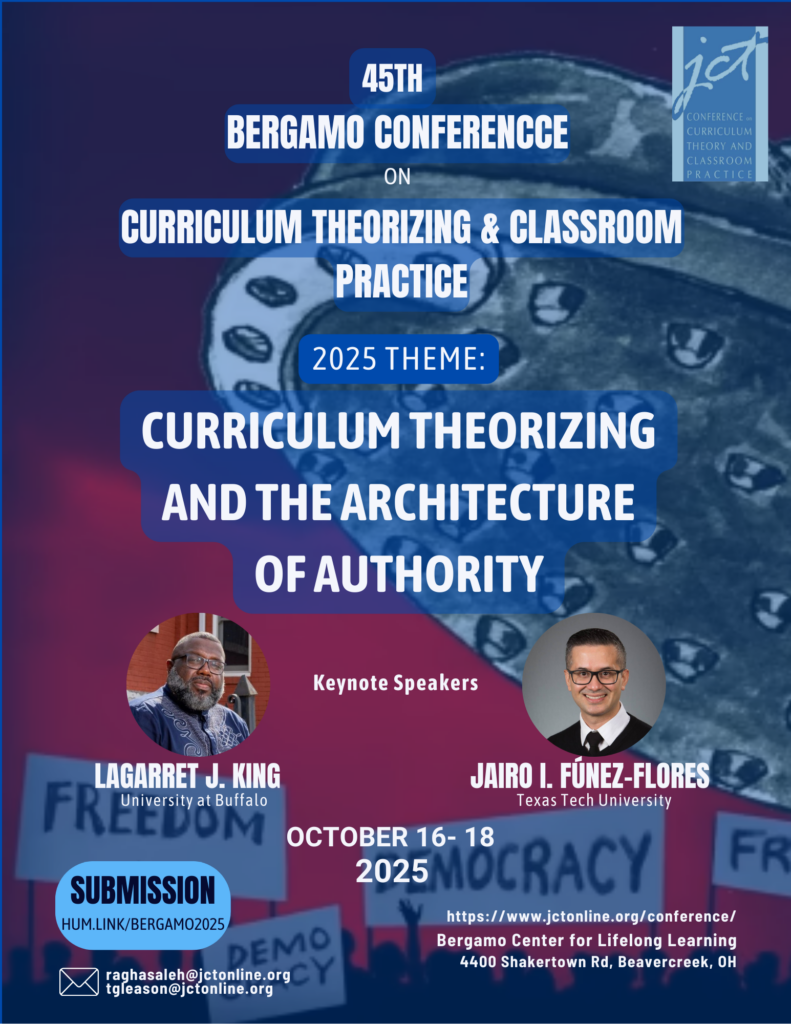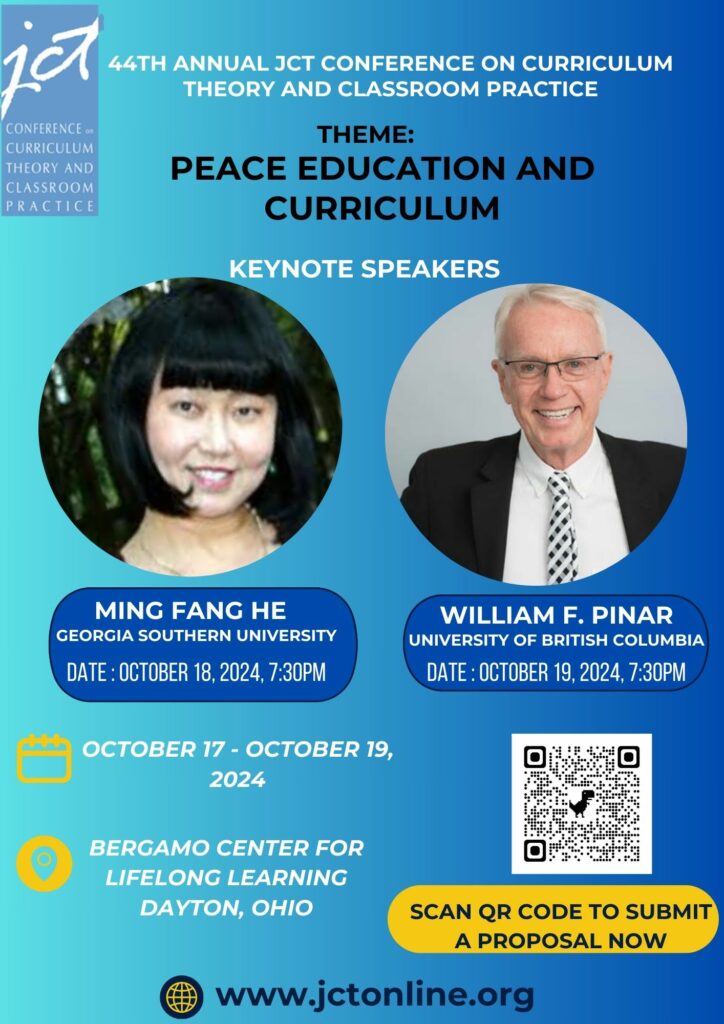2025 Call for Proposals
45th Annual Bergamo Conference on Curriculum Theory and Classroom Practice
October 16–18, 2025 | Dayton, Ohio
Theme: Curriculum Theorizing and the Architecture of Authority
We are pleased to invite proposals for the 45th Annual Bergamo Conference on Curriculum Theory and Classroom Practice. This year’s theme, Curriculum Theorizing and the Architecture of Authority, invites scholars, educators, artists, activists, and students to explore curriculum as a site of power, struggle, and possibility in the face of rising authoritarianism and reactionary politics.
An intensifying struggle over the purpose and control of education marks the contemporary moment. The rise of authoritarian conservatism, emboldened white nationalism, and reactionary movements against diversity, equity, and inclusion (DEI) has positioned curriculum as a battleground for ideological warfare. Policy initiatives to restructure governance, censor scholarship, and reshape public education threaten to narrow the possibilities of critical inquiry and democratic life.
We examine how authority is architected through curriculum—how knowledge is legitimized, constrained, or subverted in the face of mounting political interventions. Drawing from historical, philosophical, and theoretical traditions, we invite authors to consider the following questions:
- How do shifting power structures seek to reorder education?
- What forms of governance and surveillance emerge in moments of ideological retrenchment?
- How might educators and theorists resist and reimagine the role of curriculum in an era of reactionary control?
- How can creativity, playfulness, and joy inform our work of curriculum as resistance?
- In what ways does curriculum theorizing encourage thinking outside the lines in the current moment of reduced resources for teachers, students, and researchers?
By interrogating the entanglements of power, knowledge, and pedagogy, this theme calls for a reckoning with the responsibilities of curriculum theorizing in confronting the forces that seek to discipline thought, restrict possibility, and reshape the very foundations of educational institutions.
We look forward to conversations about how curricular praxes, in their myriad forms, offer paths toward more just futures—even as we remain mindful that progress is not linear, and that histories of oppression, exclusion, and authoritarianism have a way of resurfacing when left unexamined.
Keynote Speakers
- LaGarrett J. King – LaGarrett J. King is an award-winning Professor of Learning and Instruction and Director of the Center for K-12 Black History and Racial Literacy Education at the University at Buffalo. He is the author of over 70 publications, including 4 books. His most recent book, Teaching Black History for grades 6-12: An Introduction to the Black Historical Consciousness Framework, will be published in 2026. The book, co-authored with Abigail Henry, explores his Black History Framework that has been adopted in several school districts across the United States and Canada. Dr. King lives in Buffalo with his wife, Dr. Christina King, and 2 children, Preston and Presley. He enjoys movies, working in his yard, attending high school athletic events, and most importantly, being quiet.
Title: Black Scare, Critical Hope, and Protecting Black History: Black History Interventions During Times of Political and Divisive Rhetoric
- Jairo I. Fúnez-Flores – Jairo I. Fúnez-Flores is an Assistant Professor of Curriculum Studies and Teacher Education. Specializing in curriculum studies, decolonial theory, and critical ethnography, his research explores the pedagogical possibilities emerging from student movements and activist spaces. He is a founding member of the Faculty and Staff for Justice in Palestine at Texas Tech University and EdScholars4Palestine. Currently, he is advancing what he calls insurgent decolonial theory to situate thought in sites of struggle. His work has been published in Theory, Culture & Society, Globalisation, Societies and Education, Sociology Compass, and Educational Studies. Dr. Fúnez-Flores is also the co-editor of the Bristol University Press book series Decolonization and Social Worlds, lead editor of the Routledge book series Decolonial Entanglements: Praxis, Pedagogy, and Social Theory, and lead editor of the SAGE Handbook of Decolonial Theory.
Title: Curriculum Theorizing in Times of Genocide and Collective Resistance
Proposal Guidelines:
We invite proposals for individual papers, panels, symposia, alternative session formats, and artistic contributions that align with the conference theme. Each proposal should include:
- Title
- Abstract (up to 500 words)
- References
- Names and affiliations of all presenters
- Special requests or accessibility needs
Proposal Submission: hum.link/Bergamo2025
Key Dates:
Deadline to Submit: August 11, 2025
Notification of Acceptance: August 25, 2025
Conference: October 16–18, 2025
Please direct questions to the Conference Committee at raghasaleh@jctonline.org or tgleason@jctonline.org
Join us as we come together in critical dialogue, celebration, and resistance—rethinking the curriculum’s role in shaping, challenging, and reimagining authority.

2024 Call for Proposals
We are pleased to invite proposals for the 44th edition of the Journal of Curriculum Theorizing‘s annual Bergamo Conference on Curriculum Theory and Classroom Practice.
Our theme this year is “Peace Education and Curriculum.”. Please click this Link for detailed information on the 2024 call for papers.
For this conference, we essentially ask you to consider :
How do scholar practitioners in the curriculum studies field understand, know, want, create, mistake, and cultivate peace in education, curriculum, pedagogy, politics, religion, economy, health, sexuality, etc. from many perspectives, or not?
In addition to work addressing the conference theme, we invite a wide range of submissions that revolve around, but are not limited to, the following categories:
- Cultural Studies and Curriculum
- International/Transnational Curriculum Discourses
- Engaging Texts
- Higher Education and Curriculum Theorizing
- Curriculum Studies and Philosophical Perspectives
- Curriculum Theory, Classroom Practice, and Disciplinary Perspectives
Here is a link to the conference proposal submission portal. The portal will be open through August 12, 2024.
Click this Link to register for the 44th Annual JCT Conference on Curriculum Theory and Classroom Practice on October 17–19, 2024. Click this Link to reserve a room for the conference at the Bergamo Conference Center in Dayton, Ohio.
Announcing JCT’s New Editing Team, 2025–2030
After an extensive search process chaired by Isabel Nunez with search team members Denise Baszile and Brian Casemore, we are naming our new editing team and Bergamo conference hosts: Rouhollah Aghasaleh and Tristan Gleason from California State Polytechnic University in Humboldt. Their term begins January 1, 2025, and runs through December 30, 2030. Longtime members of the Curriculum Studies community, Rouhollah and Tristan have a great support team and have secured funding to support the journal and conference for their six-year term. Please join us in congratulating and supporting them on these next steps in their endeavors.

2024 JCT Keynote Speakers

Our keynote speakers:
Ming Fang He, Georgia Southern University
Friday, October 18, 2024, 7:30 pm
“Seeking Peace through Diaspora Curriculum”
AND
William F. Pinar, University of British Columbia
Saturday, October 19, 2024, 7:30 pm
“The Subjective Necessity of Nonviolence”
Keynote History
2023
Brian Casemore: On the Raveling of Deep Aspect: Curriculum as Subjective Place Curriculum
Shauna Knox: Spaces of Possibility: Critical Geography and Curriculum Inquiry
2022
Brian Schultz: Selling School Safety: Surveillance, Profit, and a Not-So Hidden Curriculum
Hongyu Wang: Freedom, Interconnectedness, and Curriculum Attunement: A Cross-Cultural Perspective
2021
Vonzell Agosto—CaRTography as Curriculum: Leaning into the Abyss
Rob Helfenbein—Spaces of Possibility: Critical Geography and Curriculum Inquiry
2019
Rubén A. Gaztambide-Fernández—Toward a Framework for Cultural Production in Education
Theodorea Regina Berry—Joy, Pain, and Hope in Curriculum Theory: A Critical Race Feminist Lyrical Message
Janet Miller —Entangling Relationalities and Differing Differences: Forty Years of Bergamo and JCT Curriculum Theorizings and Practices
2018
Nina Asher—Beyond Dualisms: Interdependence and Possibilities in Education
Nichole Guillory—A Love Letter to Black Women
David Stovall —Because They Have Come for Us, What Are We Prepared to Do? Into the Struggle for Curriculum Studies and Educational Foundations
2017
Lance T. McCready—Educational Trajectories of Black Queer Youth: From Classrooms to Ballrooms and Beyond
Jerry Rosiek—White Supremacy as an Agential Being: Curriculum Studies at the Intersection of Racial Realism and Agential Realism
Erica R. Meiners —Our Problem Child: Provocations on Dismantling the Carceral State
2016
Thomas Popkewitz—Union Organizing within the Neo-liberal State: Power, Solidarity and Imagination The Promise of Practical Knowledge and the Lorelei’s Whisper: Notes from Curriculum & Science Studies about Change that Conserves and Excludes
Petra Munro Hendry—A Rogue Curriculum: Trans-Atlantic, Creole Pedagogies and Historical Imagination
Bettina L. Love —Imagining Mattering: Hip Hop Civics Ed, Intersectionality, & Black Joy
2015
Barbara Madeloni—Union Organizing within the Neo-liberal State: Power, Solidarity and Imagination
Patrick Slattery—Toward Proleptic Experience in Arts-Based Educational Research and Practice
jan jagodzinski —The Arts at the End of the World: The Challenge of Non-representational Thought for Education — Between the Nonhuman and Inhuman
2014
Alan Block—On the Asking of Questions
Janet Miller, Jim Henderson, and Molly Quinn—Expanding Possibilities: Honoring Maxine Greene’s Influences on Curriculum Theorizing
Denise Taliaferro Baszile —In Pursuit of the Revolutionary-Not-Yet: Curriculum Studies as Creative Criticality as Radical Praxis
2013
Greg Dimitriadis—Framing Hip Hop: New Methodologies for New Times
Elizabeth St. Pierre—Post Qualitative Research
M. Francyne Huckaby—Voice, Activism, and Uprising
2011
Handel Wright—Presentist Praxis and the Cultural Studies of Education Formation
Bernadette Baker—Curriculum Studies and the 21st Century: Post-Empirical Research and the Theorization of the Invisible
William Doll—Our Mistake is in our Thinking
2010
Therese Quinn—“Every Tool is a Weapon”: Privatization, Queered Pedagogies and Public Arts Education
Sandy Grande—Education and Disaster Capitalism: Colonization the Re-Mix
Madeleine Grumet—“Gotcha” Curriculum Theory: The Penalties of Abstention
2009
William Watkins—Education and Curriculum in the New Social Order: Turning to Political Economy
Janet Miller—Nostalgia for the Future: Imagining Histories of JCT and Bergamo
Deborah Britzman—Making the Best of a Bad Job: Transference in Education and Psychoanalysis
2008
Patti Lather—Research as Praxis 2.0
Cameron McCarthy—Reading Against the Grain: Interrogating the Concepts of Tradition and Class in the Scholarship of British Cultural Studies
Kevin Kumashiro—The Seduction of Common Sense: How the Right has Framed the Debate on America’s Schools
